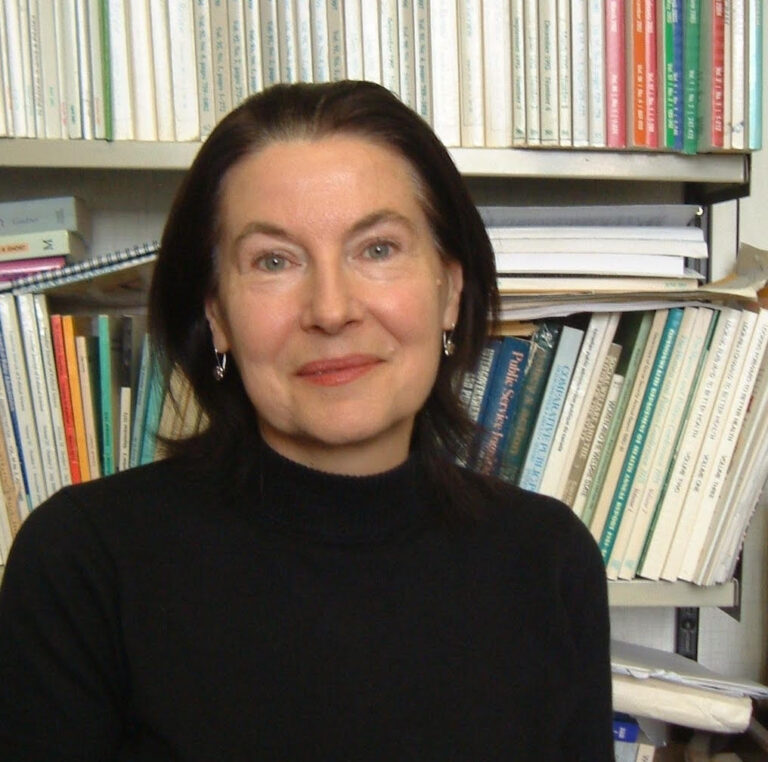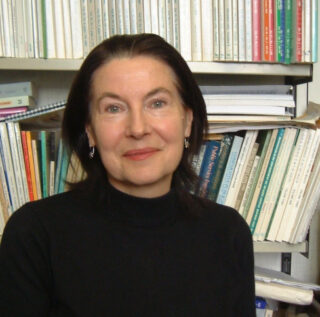- Entry type: Person
- Entry ID: AWE6053
Simms, Marian Jane
(1951 – 2021)
- Born 14 December 1951, Canberra, Australian Capital Territory, Australia
- Died 28 April 2021
- Occupation Academic, Political scientist, Public servant
Summary
Professor Marian Simms is internationally prominent for her work in the fields of gender studies and political science, ethics governance and Indigenous research policy. She has held senior academic and administrative roles in Australia and New Zealand and has long-standing interests in research culture and governance in New Zealand, Sweden, South Africa and Australia. She is a former president of the Australasian Political Studies Association (APSA), a former editor of the Association’s journal, and has published prodigiously. Marian has attended the Women’s Caucus of APSA from its inception. From 2011 to 2016 she was Executive Director for Social, Behavioural and Economic Sciences at the Australian Research Council.
Details
Marian Simms was born in Canberra and lived in the nearby country where she attended a country primary school, followed by Lyneham High School in Canberra. She won a Commonwealth University Scholarship and one of the University Scholarships awarded to the top 10 students in the ACT.
At the Australian National University (ANU) in Canberra, Marian studied Arts/Law and graduated with honours degrees in History and Political Science. Her honours supervisor, L F ‘Fin’ Crisp influenced her work. While he supported her academic research, Crisp’s belief that the private sphere, rather than the public, was particularly important for women inspired Marian’s commitment to address the gender gaps in his otherwise authoritative contributions to Australian political history. At the time Thelma Hunter was an enthusiastic first-year tutor of Marian, who introduced students to a wider societal perspective in her political sociology lectures and through her supervision.
After graduation, Marian took up a teaching fellowship at the University of Adelaide rather than taking up a PhD scholarship at the ANU. After twelve very interesting months at the Adelaide Politics Department she accepted a postgraduate scholarship for a Master of Arts in Political Science at the University of Melbourne. She soon moved her research to La Trobe University when offered a Commonwealth Scholarship for a PhD. She was co-supervised by Joan Rydon, who had a prodigious knowledge of Australian and British politics and was Australia’s first woman professor of politics (1975). While Joan provided great critical insights into her PhD research on the Menzies Government and Public Enterprises, she was less supportive of Marian’s research on women’s activism of the period.
Marian presented her postgraduate research at conferences in Australia and the United States and had papers published in Women’s Studies: International Quarterly (edited by Dale Spender), and Politics (the forerunner to the Australian Journal of Political Science). Noted political psychologist Fred Greenstein’s visit to Melbourne University brought Marian in contact with a group of influential women scholars from the United States of America who invited her to present her work in the USA. These scholars included Judith Stiehm, Joyce Gelb, Rita Mae Kelly, Jane Bayes and Mary Hawkesworth. Under Kelly’s leadership, several of this group were crucial to the establishment of the Gender, Globalization and Democratization Committee of the International Social Science Council (ISSC) in 1998, and the Globalization, Gender and Democratization Research Committee of the International Political Science Association (IPSA) in 2002.
As a postgraduate student at both Melbourne and La Trobe, Marian lectured part-time at the University of Melbourne. This provided her with valuable experience and a platform for subsequent appointments at the Canberra College of Advanced Education (from 1990 the University of Canberra) and the ANU. She returned to her undergraduate university, the ANU, in 1985 as Lecturer in Political Science and was promoted to Senior Lecturer and then Reader, acting as Head of Department in 1996-97. She taught Political Science 1 for many years, and supervised many Honours, Masters and PhD students, some of whom are now senior academics and public servants. Marian also enjoyed visiting fellowships to the Research School of the Social Sciences during this time to work on several projects including the Ageing and the Family project (part-time 1985-86) and then the Reshaping Australian Institutions project (1995-96) where she worked on the future of Australian political parties.
In 2002 she was appointed Chair in Political Studies and Head of Department at the University of Otago in Dunedin, New Zealand, the first woman to serve in these roles. In 2009, Marian returned to Australia as Head of the School of History, Heritage and Society at Deakin University, Melbourne. In 2011, Marian was appointed Executive Director, Social, Behavioural and Economic Sciences at the Australian Research Council (ARC).
As an early career academic at the ANU, Marian was part of a small group, which established the first national survey of political candidates that included questions about attitudes to gender, among other things, that were being used in US and United Kingdom (UK) surveys. Marian subsequently used the gender questions in a set of surveys administered to Australian party elites in the mid-1990s funded by the ANU under the ARC’s small grants scheme. The Hon. Joan Kirner cited some of this research in the Victorian Parliament to illustrate that Labor Party conference and council delegates supported Affirmative Action as a gender equity strategy. The work was published in Australian and international journals and edited collections. In collaboration with Pippa Norris (US) and Joni Lovenduski (UK) and others, Marian also examined candidate selection systems for their role in the political under-representation of women and minority groups.
Marian became involved in the Women’s Caucus of the APSA when it was founded by Carole Pateman and Marian Sawer at the 1979 APSA conference in Hobart. During her years as Executive Director at the ARC (2011-16), she presented regular reports to the Caucus’s Annual General Meeting on how women fared in ARC funding and updated the group on ARC’s gender and workforce policies.
As a co-editor of the Australian Journal of Political Science (2011-16) she ensured that its annual reports showed the gender statistics in terms of submission and acceptance rates and publishing patterns, such as single versus multiple authorship.
Marian’s publications list includes 5 authored/co-authored books, 9 edited/co-edited books, over 50 chapters in edited collections, a prodigious number of journal articles, conference papers, monographs, reports and published public lectures. She was awarded research funding by the ARC and its predecessor schemes, the United Nations Educational and Cultural Organisation (UNESCO), the Academy of the Social Sciences in Australia (ASSA), the International Social Science Council (ISSC), the National Council for the Centenary of Federation, and the Sequi-Centenary Council of New South Wales. An edited collection of papers on women and politics, presented at sessions of the Women’s Caucus of APSA in the early 1980s, prepared for Politics, was subsequently edited by Marian for Longman Cheshire (Australian Women and the Political System, 1982). In 1984 Allen & Unwin published A Women’s Place co-authored with Marian Sawer; a substantially revised second edition was published in 1994. Her books on political parties commenced with A Liberal Nation (Hale & Iremonger, Sydney, 1982), followed by The Paradox of Parties: Australian Political Parties in the 1990s (edited) (Allen & Unwin, 1997).
Marian’s continuing interest in gender regimes was reflected in articles, chapters and seminar papers on gender and leadership, exploring the opportunity structures and barriers to women’s political contributions, including a 2008 article in Signs: The Journal of Women, Culture and Society, and research comparing Margaret Thatcher and Helen Clark published in Paul ‘t Hart and John Uhr’s book Public Leadership: Perspectives and Practices (2008). Her work on the emergence of democracy included an edited book on the 1901 election (2001), a book on the origin and evolution of New South Wales democratic institutions, From the Hustings to Harbour Views (2006), her inaugural professorial lecture on ‘Settler Democracy’ in Australia and New Zealand (2004), and her co-edited volume on Political Parties and Democracy: Africa and Oceania (2010). This work both explained and critiqued these processes including their limitations in terms of equal representation for women and Indigenous people.
Marian is active in the administration and evaluation of research. From 2005 to 2009 she was the inaugural convenor of the Humanities Research Cluster on Political Communication, Policy and Participation at the University of Otago. The cluster sponsored research on political communication in British, Australian and New Zealand elections, research workshops for postgraduates, public lectures and several high-profile visitors. From 2003 to 2006 she chaired IPSA’s Research Committee on Gender, Globalization and Democratization. The Swedish Research Council invited her to chair the process for selecting and evaluating new centres of research excellence in 2006 and 2008, and she served two terms as a member of the Social Science panel of the Performance Based Research Funding Evaluation in New Zealand (equivalent of Australia’s Excellence in Research for Australia). She reviewed the South African Indigenous Knowledges Program for the South African National Research Foundation; the final report was published in 2015. She has served on numerous boards and committees, including Deakin University’s Institute of Koori Education.
Other activities have included the Quality of Governance Study Group, associated with the American Society for Public Administration, and the Gender and Politics Group, associated with the American Political Science Association.
In her role as Executive Director for Social, Behavioural and Economic Sciences at the Australian Research Council from 2011 to 2016 Marian ‘contributed significantly to Australian research, including undertaking extensive outreach to promote and improve the ARC’s research workforce policies, to support early-career researchers, women researchers, researchers re-entering the workforce after career-breaks and Indigenous researchers. She also contributed to national research ethics reviews.’ (ARC media release, 29 Nov 2016).
From October 2014, Marian was Adjunct Professor at Deakin University, Geelong, Victoria, Australia and from 2015 she was Adjunct Professor at the University of Canberra, ACT, Australia. She was appointed a Fellow of St Margaret’s College, University of Otago in 2003.
This entry was sponsored by a generous donation from the late Dr Thelma Hunter.
Events
-
1982
Potter Foundation postdoctoral travel award
-
2003
For contribution made to Australian society’, specifically for her research on the 1901 election.
Centenary Medal -
1988 - 1989
University of Southern California
Senior Fulbright Award
Digital resources
Published resources
-
Resource Section
- Political Science, Grey, Madeline, 2014, http://www.womenaustralia.info/leaders/biogs/WLE0178b.htm
- Journal Article
-
Resource
- ARC welcomes Associate Professor Therese Jefferson and thanks Professor Marian Simms, 2016, http://www.arc.gov.au/news-media/media-releases/arc-welcomes-associate-professor-therese-jefferson-and-thanks-professor
- Book
- Edited Book
- Lecture
- Book Section
-
Site Exhibition
- Women Who Caucus: Feminist Political Scientists, Australian Women's Archives Project, 2017, http://womenaustralia.info/exhib/caucus/
